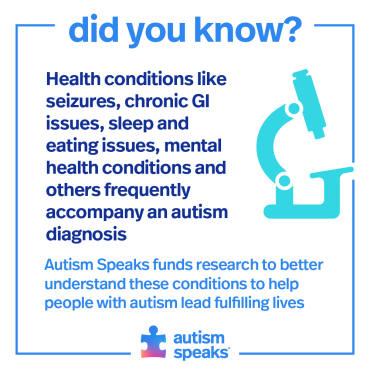Autism spectrum disorder (ASD)
What is autism?
Autism, or autism spectrum disorder (ASD), refers to a broad range of conditions characterized by challenges with social skills, repetitive behaviors, speech and nonverbal communication. According to the Centers for Disease Control, autism affects an estimated 1 in 36 children and 1 in 45 adults in the United States today.
We know that there is not one type of autism, but many.
Autism looks different for everyone, and each person with autism has a distinct set of strengths and challenges. Some autistic people can speak, while others are nonverbal or minimally verbal and communicate in other ways. Some have intellectual disabilities, while some do not. Some require significant support in their daily lives, while others need less support and, in some cases, live entirely independently.
On average, autism is diagnosed around age 5 in the U.S., with signs appearing by age 2 or 3. Current diagnostic guidelines in the DSM-5-TR break down the ASD diagnosis into three levels based on the amount of support a person might need: level 1, level 2, and level 3. See more information about each level.
Many people with autism experience other medical, behavioral or mental health issues that affect their quality of life.
Among the most common co-occurring conditions are:
- attention-deficit/hyperactivity disorder (ADHD)
- anxiety and depression
- gastrointestinal (GI) disorders
- seizures and sleep disorders
Anybody can be autistic, regardless of sex, age, race or ethnicity. However, research from the CDC says that boys get diagnosed with autism four times more often than girls. According to the DSM-5-TR, the diagnostic manual for ASD, autism may look different in girls and boys. Girls may have more subtle presentation of symptoms, fewer social and communication challenges, and fewer repetitive behaviors. Their symptoms may go unrecognized by doctors, often leading to underdiagnosis or misdiagnosis. Getting a diagnosis is also harder for autistic adults, who often learn to “mask”, or hide, their autism symptoms.
Autism is a lifelong condition, and an autistic person’s needs, strengths and challenges may change over time. As they transition through life stages, they may need different types of support and accommodations. Early intervention and therapies can make a big difference in a person’s skills and outcomes later in life.
There is no one type of autism, but many.
- Stephen Shore
Related resources
- M-CHAT-R Screening Questionnaire: Do you suspect your child might have autism? Take this two-minute screening questionnaire. You can use the results of the screener to discuss any concerns that you may have with your child’s health care provider.
- First Concern to Action Tool Kit: If you have concerns about how your child is communicating, interacting or behaving, you are probably wondering what to do next. This Tool Kit offers resources to help guide you on the journey from your first concern to action.
- A Parent's Guide to Autism: If your child has recently been diagnosed with ASD, you have come to the right place. This guide was created to support you and help you build a happy life for you and your child.
- We also offer guides for grandparents and siblings.
- 100 Day Kit for Young Children: Knowledge is power, particularly in the days after an autism diagnosis. If your child is age 4 and under, this Tool Kit can help you make the best possible use of the 100 days following the diagnosis.
- 100 Day Kit for School Age Children: If your child is between ages 5 and 13 and was just diagnosed with ASD, this Tool Kit can help you learn more about autism and how to access the services that your child needs.
- Adult Autism Diagnosis Tool Kit: Are you an adult who suspects you may have autism? Have you been recently diagnosed with ASD? Developed by and for autistic adults, this guide can help you figure out what comes next.
- Find local providers and services in your area with the Autism Speaks Resource Guide.
Contact the Autism Response Team
Autism Speaks' Autism Response Team can help you with information, resources and opportunities.
- In English: 888-288-4762 | help@autismspeaks.org
- En Español: 888-772-9050 | ayuda@autismspeaks.org




